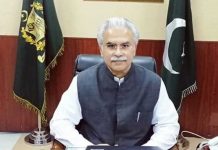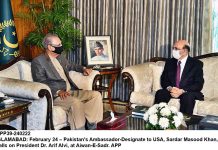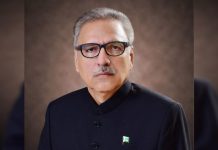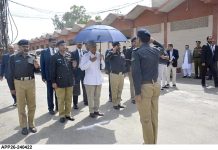مضمون کا ماخذ : ڈاگ ہاؤس
Speakers concerned over-criminalization of freedom of expression in IOK
ISLAMABAD: Speakers at a webinar hosted by Kashmir Institute of International Relations (KIIR) in collaboration with World Muslim Congress (WMC) have voiced grave concerns over the criminalization of dissent by Modi’s racist regime in the Indian occupied territory of Jammu and Kashmir.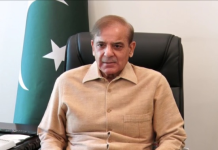
ISLAMABAD: Speakers at a webinar hosted by Kashmir Institute of International Relations (KIIR) in collaboration with World Muslim Congress (WMC) have voiced grave concerns over the criminalization of dissent by Modi’s racist regime in the Indian occupied territory of Jammu and Kashmir.
The webinar titled “Criminalization of freedom of expression in IoK ” was held on the sidelines of 49th session of the UNHRC.
Panelists hailing from different parts of the world including Ms. Mary Scully, Robert Fantina author and journalist, Barrister Tanvir Munim, Sheni Hamid, Advocate Nasir Qadri, Ms. Naila Altaf Kiyani, Prof. Dr. Shugufta Ashraf, and others, said a press release here on Wednesday.
Whereas the event was moderated by the KIIR Chairman Altaf Hussain Wani.
In his initial remarks, the KIIR chief said that the right to freedom of peaceful expression was a fundamental human right of every human being. He said that this inalienable right has been enshrined in article 19 of the UN human rights bill.
Along with freedom of expression, Wani said that a raft of other international treaties guarantees the right to freedom of peaceful assembly, freedom of right to expression, and opinion. These fundamental freedoms he said were central for living in an open and free society, in which people can access justice and other judicial remedies.
Defending these rights, he said, have been a core part of the HR organizations. “Ironically, in today’s Kashmir these essential freedoms remain largely suspended and virtually non-existent”, he said adding that surveillance on print and digital media, ban on political activities, peaceful assembly and right to expression and witch-hunt against Kashmiri rights activists by the Indian occupation authorities go largely unnoticed at international level. He said that Kashmiris have been at the receiving end for the last 30 years, however, in the aftermath of 5th August 2019 the situation in the region has deteriorated to an alarming level.
Since then, Wani said, “Sedition and Unlawful Activities (Prevention) Act (UAPA) have been weaponized by India’s racist regime and used routinely against critics of its repressive policies”. He said that the Press Council of India-a government body, in its report has documented evidence of many Kashmiri journalists that speak volumes about how the Indian government was using repressive laws to stifle the dissent in the region.
The use and abuse of these infamous laws by the Indian authorities he said has led to ruthless suppression of dissent in the region. “Be it a political worker, journalist, civil society activist or a human rights defender everyone is being silenced by being accused of sedition and other offenses under these draconian laws”, he said.
Citing Article 19 of the International Covenant on Civil and Political Rights (ICCPR) and other international laws, the panelists stated that the law clearly states that “everyone shall have the right to freedom of expression.” They said that it was unfortunate that India’s apartheid regime has been using these laws as a tool to criminalize peaceful expression in the disputed territory.
In addition to the Indian government’s control of the communication process, they observed that the unwanted and uncalled for curbs on media such as surveillance, formal/informal investigations, harassment, intimidation, restrictions in all the process of news-gathering have hugely hampered the journalistic activities in the region besides undermining the role of free media.
Voicing their grave concerns over the prevailing situation in the region the panelists said, “India has time and again used black laws to stifle the dissent in the territory and suppress people’s legitimate resistance for the realization of the right to self-determination”.
Describing these laws as the biggest threat to freedom of expression in Kashmir, they said that criminal defamation, violence against journalists, limits on the right to information, commercial pressures, and mechanisms to seek control over the media were amongst the worst tactics the Indian government has been using to silence the independent media and journalists in Kashmir.
The speakers said, “In recent years, India’s criminal defamation laws have been used against journalists, activists, and other citizens, raising their voice against the policies of oppression and suppression of the Indian government.”
The panelists on the occasion said, “The occupied territory has witnessed an alarming increase in attacks on peaceful speech and expression, especially after August 5, 2019 when Indians in brazen violation of the international covenants stripped Kashmir of its special status”.
They said that it was high time that the international community should take effective notice of the situation in the held territory and pressurize the Indian government to restore all fundamental freedoms in Kashmir.



